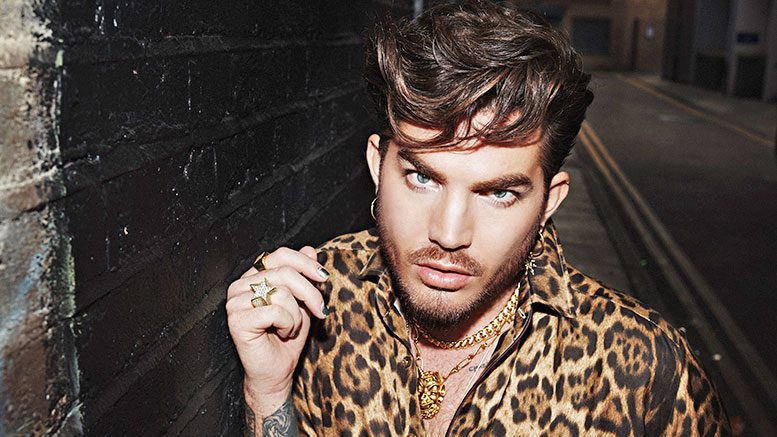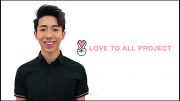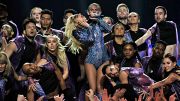Glam-pop artist Adam Lambert talks LGBTQ music evolution, his full-circle Cher moment
By: Chris Azzopardi*/Special to TRT—
At this point, American Idol is a mere footnote in Adam Lambert’s undaunted, venturesome, decade-long career. It was 2009 when Lambert astonished gays and moms with his confident strut and those sky-high notes, ultimately giving him the runner-up spot during the reality show’s eighth season. Since then, the out San Diego native, now 37, has checked some pretty wild boxes. Making Cher cry? Check. Queen frontman? Check. With his latest album, Velvet: Side A, the glam pop-rocker is checking yet another box, one that’s especially important to him: the box that lets him call the creative shots.
Recently, Lambert phoned to talk about the classic, Queen-influenced sound of some of his best music yet, the progress made for LGBTQ artists, and his ongoing mission to root his career in “honesty and authenticity.”
Q: It must be such a great feeling to promote a project you were so invested in from the get-go.
Adam Lambert: Because I was so involved and so in the driver’s seat on this one, the sense of gratification I get from talking about it and sharing it runs deeper than ever before.
Q: What are you giving yourself permission to do that you couldn’t do at the beginning of your career?
A: I think it really all comes from knowing myself better. Knowing myself as an artist, knowing myself as a person, knowing what is keeping it real. And if something comes up that just doesn’t feel authentic, I’m just like, “No, I don’t want to do that.” Which is great. And obviously, having put the time in over the last 10 years into my career, I think I’ve earned more of that right. I’m doing what I want to do, period, the end. Everything about this project is me doing what I want to do. Creatively, I’m not having to compromise with anybody.
Q: So are the EDM days over then?
A: For now. (Laughs.)
Q: That must feel refreshing.
A: Yeah. I think I wanted to do something sonically that just felt like a different page for me, and also something that felt timeless, something that wouldn’t go out of date in three years. I just wanted to do something that felt classic.
Q: Has touring as the frontman of Queen influenced that desire?
A: There are definitely some parallels there, for sure. I think having been part of that lineup has definitely rubbed off on me and made me realize it’s not always about the next sound. That’s not always the way to have the strongest connection with an audience. It doesn’t always need to be something that’s the next wave. It can be something that works that people love.
Q: When you decided to make the move and jump from your former label Warner Bros. to Empire, an indie label, what was the breaking point? At what point in your career did you feel so limited that you just couldn’t stand it anymore?
A: I don’t know if it was all that dramatic, to be honest with you. I love the way you put it. Very dramatic. (Laughs.) I don’t think there was a final straw or anything; there was no big drama. But I just got to the point where I was done with my last solo tour, and I was doing some touring with Queen and I reflected on all the work that I put into it. I was wondering if there was enough return on my investment: “Am I feeling a sense of personal gratitude and gratification here?” And I had to ask myself some hard questions. So a lot of the changes that I made were to protect and insulate my creativity a little bit more. I felt like as an artist I wasn’t reaching my fullest potential, because of a lot of the things that were being done where the main motivating force was money or popularity or obvious things that pop music revolves around. I think I just had to get the balance right. Obviously, it is a business and I’m still playing the game to a certain extent, but the balance was off. So that was the big, important realization I had.
Q: Who do you admire for putting artistic integrity before commercial success?
A: There’s a list, for sure. But recently, I do think that Lady Gaga has been an amazing example of somebody who’s gone against what was obvious or expected of her and done what made her happy, and I think at the end of the day the thing that I had to come to the realization of is, “If I’m happy with it and it feels authentic to me, that will come across to the public.” In the past, I may have been guilty of trying to please the outside before the inside and trying to just do what was trendy or popular or what somebody else was doing as opposed to something that felt like it would make me happy, first and foremost.
Q: Was there a lot of pressure on you to conform?
A: (Hesitates.) There was definitely some pressure put on artists in my position. But also, it’s me not being an idiot. I’m looking around, aware of how it works, and that is in many cases just how it works. You have a lot of people you’re trying to make comfortable, a lot of people you’re trying to make feel like they’re a part of something. And you have to make a lot of compromises in order to do that.
Q: You’ve said one of the reasons you decided on the name Velvet for the album is because The Velvet Rage: Overcoming the Pain of Growing Up Gay in a Straight Man’s World, published in 2005, left a big impression on you during your formative gay years. How did you come across The Velvet Rage and what was one of the greatest lessons you learned from it?
A: Just word-of-mouth. Somebody had mentioned it and then I read it, and it’s an eye-opener because it basically breaks down the general psychology of what being a gay man is, and most specifically what they identify as and how to grow up gay in a straight world. Obviously it’s a bit out of date now—we are in a time where gay is way more mainstream, and a lot of these things are kind of obvious—but I think at the time, when I read it, it wasn’t as discussed, it wasn’t common knowledge like it is now. But it kind of breaks down the sort of different gay tropes and patterns and behaviors, and it opened my eyes.
Q: Did it make you feel more comfortable with yourself?
A: Yeah. And also more comfortable with my community. I think it made me understand all of us more. It was a personal realization, like, “Where do I fit into these patterns?” but also meeting people and realizing like, “Oh, I get it, that’s probably why they are this way—because of this.” And it made me more empathetic toward others in the community, like my gay friends, people who I dated. It just made me understand it all more.
Q: And now you’ve been this trailblazer for the LGBTQ community for the last decade, and there are so many artists who have followed in your footsteps: Troye Sivan, Hayley Kiyoko and Lil Nas X. The list is much longer than when you first came out publicly on the cover of Rolling Stone in 2009.
A: I know, I love it. I love seeing that. I love that it’s become sort of a non-issue. I think young people today are like, “Yeah, so what?” (Laughs.) And that’s how it should’ve always been. It’s true, though, something has shifted. When I came to the business, it was people who were older than me who were the ones who were fearful. They were the ones who were ignorant of the type of person I was and also ignorant of the idea that sexuality doesn’t have to be at the forefront of every choice that I’m making as an artist. It’s not. It doesn’t work that way. We’re all people. It’s something that I’m really proud of. It’s a very key defining part of my personality, but you don’t have to be gay. The executives didn’t realize that you don’t have to be gay to listen to a gay artist.
Q: It seems a big part of your fan base is straight moms, so clearly you can bridge gaps and cross boundaries. You’ve done it.
A: Yeah, I’d like to think so. Look, over the past 10 years, I definitely don’t consider myself an expert in any way. I’ve been confused and scratching my head along the way as well, but I always try to keep the mission going forward with honesty and authenticity. I can promise myself and my fans those two things and that’s all I need to worry about, really, at the end of the day: if I’m being real and if I’m being truthful.
Q: When it comes to LGBTQ artists in music, where do we go from here? What’s next?
A: I feel like we’re heading in the right direction. Obviously, society is in a weird place right now given the current political climate. We were all in a much more progressive forward-motion a couple of years ago, before the changeover, and I think that the pendulum has swung backward and we’re seeing a lot of bigotry brought to light, a lot of hate and negativity that’s kind of swirling around. So I think as artists the best thing we can do is continue to combat that with positivity and lead by a good example and try to give a voice to those who feel like they’re being told they’re not allowed. I think what we need to do is continue. Keep going, keep pushing. And when the opposition is stronger, we have to push back stronger.
The other thing that I’m really loving about where we’re at right now is 10 years ago, when you look at mainstream entertainment, it was a small selection of entertainment that got pushed out. There were only so many songs on the radio, there were only so many films going on, and that’s what everyone talked about. But now with media, it’s really interesting because we have way more at our fingertips. We have streaming, we have YouTube, we have a zillion channels on TV. There’s more available to people. So I think that artists can now find their audience more easily; there’s an audience for everything. And I think that’s one of many reasons why we’re seeing more gay success in music because we’re able to be put in front of our audiences. There’s less gatekeeping going on.
Q: Right, because you can tweet your followers directly.
A: And that was not the case 10 years ago. Twitter was just started 10 years ago, and I remember being like, “Oh.” We were sort of at the mercy of the machine, and I think that’s a big difference to where we’re at now.
Q: Getting back to Queen: Do you have a drink with its veteran members, Roger Taylor and Brian May, at the hotel bar after a show?
A: Occasionally, yeah. I’ve been known to have a cocktail with Brian and Roger at a bar, yeah.
Q: What’s your drink of choice when drinking with Queen?
A: Oh, tequila always. I’m a tequila man. And I’m only snobby about a couple of things in my life and tequila’s one of the things that I’m a bit of a snob about. I’ve become a tequila snob. And I’m mostly snobby about it not because I wanna seem like, “Oh this is how much this costs,” but more so the quality and what it does to my stomach. (Laughs.)
Q: We’re officially old.
A: I don’t want alcohol regret.
Q: Last year you sang a beautiful ballad version of “Believe” for Cher at the Kennedy Center Honors and brought her to tears.
A: I really had an amazing time doing that. Cher is one of my heroes. Obviously, she’s an icon. She’s had, like, moments in every decade that she’s been around; it’s so undeniable, and to sing for her, what a treat. And it was such an honor. I remember getting that album when I was in high school and when I finally got my first car during my senior year—I was driving the family car forever—that CD had just come out and I remember listening to it really loudly on the freeway and listening to “Believe.” So when I got up on stage to do that, that memory came flooding back to me.
Q: Did you get to tell Cher that story?
A: Unfortunately I didn’t get to see Cher afterward because she had to leave right away to get to New York because her Broadway show was opening the next day. I got a message from her via e-mail, via her manager, and they were all very sweet.
Q: And she cried during your performance. Is there any better compliment?
A: I didn’t realize she was crying because I couldn’t quite see that far back in the audience. But when I saw the footage afterward, I was like, “Wow, that’s pretty special.”
Q: Have you given any thought to what a Velvet tour might look like?
A: Yes. I’m not ready to talk about it yet, but of course, I’ve been thinking about it. It’s something that I’m planning on putting together, but it’s a ways off. One thing at a time.
Q: One of your Glamberts wanted to know if you would ever consider doing a show where your fans could decide the setlist?
A: (Pauses.) Mmm. A whole show? No. (Laughs.) But I would definitely consider having some fan input on something in the show. Yeah, I think that’d be cool. Trust me, I’m on social media, I watch and look at what people are responding to and how people are reacting. On this project, a lot of this stuff was kind of for me. I wanted to make myself happy first and foremost on this project, but also, of course, I had my fans in mind when I wrote these songs.
With “Superpower,” for example, I wanted to write something so everybody could feel a sense of confidence when they listen to it, everyone could get a sense of standing up for yourself and having that empowerment moment. That wasn’t just for me—that’s for everybody. For “Stranger You Are,” I’ve seen so many fans write things about feeling like an outsider, feeling unsure about being different, and that was one of the things they felt was a common connection between us: the fact that I’m that way too and that I’ve walked through the world feeling that way as well. And “Stranger You Are” is all about that. It’s acknowledging, “Yeah, no shit, being different is not always the easiest road but that’s who we are and I’m gonna celebrate it.”
Q: To clarify: You do trust your fans?
A: One-hundred percent.
Q: Just not enough to create your setlist?
A: Well, it’s kind of like when you go to a restaurant and you let the chef pick the menu. Like, sit down. Let me give you a great meal.
*As editor of Q Syndicate, the international LGBTQ wire service, Chris Azzopardi has interviewed a multitude of superstars, including Cher, Meryl Streep, Mariah Carey, and Beyoncé. His work has also appeared in The New York Times, Vanity Fair, GQ, and Billboard. Reach him via Twitter @chrisazzopardi.








His fanbase is straight moms? How about women/men who appreciate his insane vocal instrument & emotional delivery? I would bet that demographic far outweighs the “straight moms.”